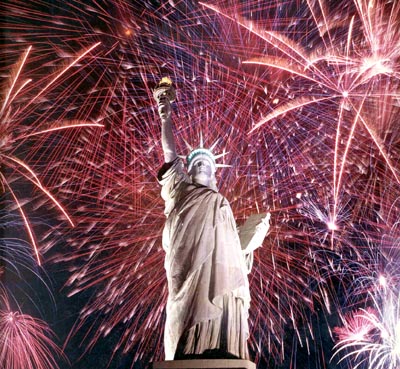Hello Mr. Taylor. The other kids in my class say that every country celebrates Independence Day on July 4th and that it’s a global holiday, but I don’t think that’s right. Does every country really celebrate July 4th or are they just wrong?
The answer is a bit complicated because you’re both right. Your classmates are right that just about every nation on the Earth celebrates an independence day of some sort, but not all on the same day, and they certainly don’t all celebrate American Independence Day on July 4th each year. In fact, Canada’s independence day celebration, Canada Day, is just a few days earlier, on July 1, though unlike in the United States, that date isn’t an official moment in time when they changed from an English territory to an independent nation.
Other countries not only have different dates for their celebrations, but they also celebrate their independence differently too. For example, France celebrates the storming of the Bastille on July 14, 1789, an event that marked the beginning of the French Revolution. On Bastille Day, as they call it, it’s customary for firefighters to organize dance parties, and there are also traditional military parades, along with festivals and fireworks.
Mexico celebrates September 16 as its independence day, commemorating the day in 1810 that the country declared its independence from Spain, and started a ten-year war with Spain. In fact, Mexico at the time was known as “New Spain”. Celebrations include rodeos, bullfights, parades and traditional Mexican dances.
 A bit further south, in Peru, they celebrate July 28 as their independence day, actually starting the celebration the night before with folk and Creole music in public plazas and parks throughout the country. Three festivals are fundamental to the Peruvian Creole culture during the celebration: cockfighting, bullfighting and Peruvian paso horse exhibitions.
A bit further south, in Peru, they celebrate July 28 as their independence day, actually starting the celebration the night before with folk and Creole music in public plazas and parks throughout the country. Three festivals are fundamental to the Peruvian Creole culture during the celebration: cockfighting, bullfighting and Peruvian paso horse exhibitions.
India celebrates its independence from England on August 15 each year, commemorating their declaration of independence in 1947. Flag-hoisting ceremonies occur throughout the country, including schools, homes and capital buildings. Flying kites has also emerged as a popular tradition for independence day, including aggressive fighting kite competitions!
Australia celebrates on January 26th, Indonesia celebrates on August 17th, Argentina on July 9, Cameroon on January 1st, Bolivia on August 6th, Costa Rica on September 15th, Libya on December 24th, Malta on September 21st, Moldova on August 27th, Portugal on December 1st and Singapore on August 9th. It’s all over the map.
Fireworks, it turns out, have been around for almost a thousand years, coming from both China and India originally. The first English use of fireworks was a celebration of the wedding of Henry VII in 1487. Enthusiasm for fireworks traveled across the Atlantic to the early colonies too. In fact, apparently tricksters in Rhode Island caused enough problems that a ban on the mischievous use of fireworks was established in 1731.
And in terms of fireworks being used for Independence Day in the USA? Turns out that John Adams wrote the following to his wife on July 3, 1776: “[our independence day] ought to be solemnized with pomp and parade, bonfires and illuminations (fireworks) from one end of this continent to the other, from this time forward forever more.”
So now you know. Hope that helps you figure things out with your classmates!

We in the UK do not have to celebrate our independence – the last successful invasion of what was then England was in 1066 – and that was only by the descendants of an expatriate member of a former Royal family. England joined with Scotland, and later Ireland, to form the current United Kingdom, although a large part of Ireland was granted independence in 1921. However, it looks as if we might soon start to celebrate our independence from the less than popular European Union.
Basically, we’re not a phenomenally demonstrative bunch; largely we are comfortable with our lot, and see no reason to announce it to everyone – but as many (Spain with their Armada, France under Napoleon, Germany under Hitler) have found, don’t push us; you’ll come off worst!
Incidentally, if France hadn’t aided the rebel colonists by tying up the Royal Navy back in the 18th Century, you might not have an Independence Day to celebrate…
Dave, as strange as it may sound to an American viewpoint, we never had a revolution.
Dominion Day celebrated the granting of legislative independence to the British North American colonies of the time by the Westminster Parliament, effective July 1, 1867, as a response to the potential military threat by the USA following the Civil War. Britain maintained authority over Canadian foreign policy until 1931. In 1982, in recognition of “re”patriation of the British legislation that created Canada, July 1 was renamed Canada Day. Canada remains a constitutional monarchy with Elizabeth II as our current Head of State.
These Wikipedia articles explain the situation well:
https://en.wikipedia.org/wiki/Dominion
https://en.wikipedia.org/wiki/Canada_Day